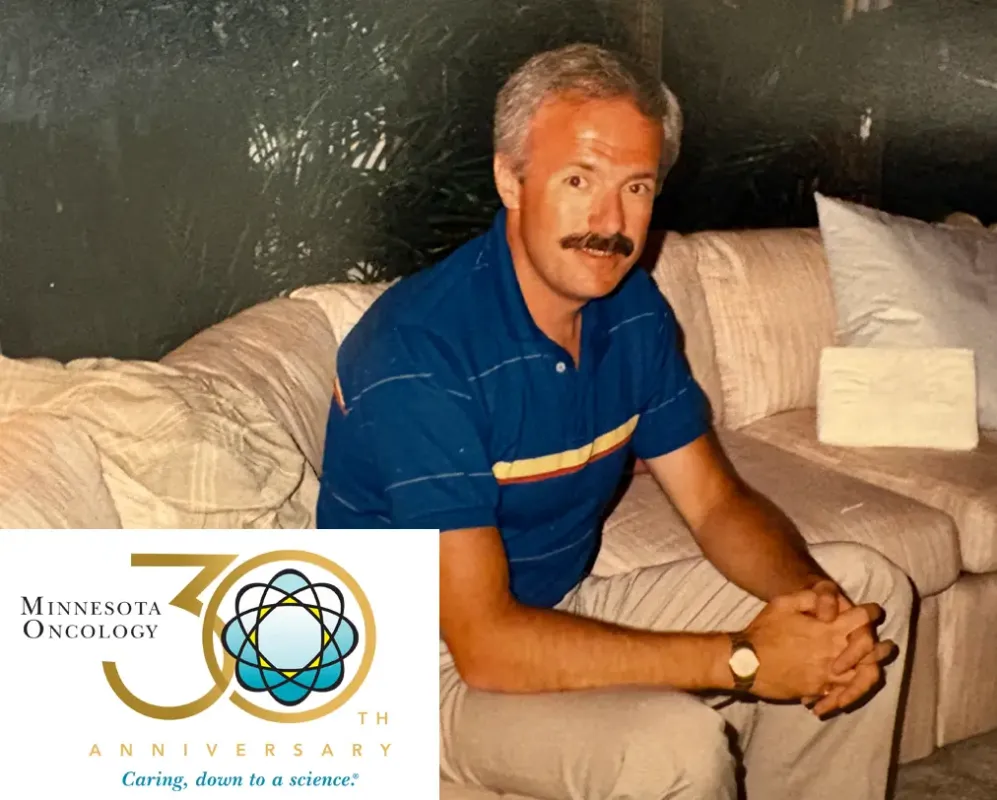As we celebrate 30 years of providing patient care, we are sharing stories about people who helped shape Minnesota Oncology to be the exceptional cancer practice it is today. This is the story about the origins from one of the founders, Dr. Thomas Flynn.
In 1981, Dr. Flynn began his career at St. Paul Ramsey Medical Center, which is now Regions Hospital. In 1987, Dr. Flynn was contacted by his college and medical school friend, Dr. P.J. Flynn, to join Oncologic Consultants in Minneapolis.
“For me it was really a great opportunity and a great career change as at St. Paul Ramsey Medical Center the focus was on general internal medicine and subspecialties weren’t getting the same level of attention that I thought they should. There were just two of us doing hematology oncology at that time and the opportunity to join a group that was focused on hematology oncology as the primary specialty was exciting to me,” said Dr. Flynn.
In 1995, three oncology groups from across the Twin Cities joined to form Minnesota Oncology Hematology, P.A. (MOHPA), which was later rebranded Minnesota Oncology. The practice was initially comprised of a small team, including Dr. Flynn, Dr. John Brown, Dr. Ignatio Fortuny, Dr. Burton Schwartz, Dr. Mark Sborov, Dr. Margaret MacRae, and Dr. P.J. Flynn.
The providers envisioned a practice that would not only offer cutting-edge cancer care but also pioneer programs, while remaining independent. “Our focus was to remain as a physician-owned, physician-run practice, not employees of a health system,” said Flynn.
According to Dr. Flynn, a significant milestone in Minnesota Oncology's journey was its strategic partnership with the Physician Reliance Network, which evolved to become The US Oncology Network. This alliance provided the practice with management support, enabling it to remain independent and physician-run amidst a competitive healthcare environment.
“This independence allowed Minnesota Oncology to focus solely on providing the best care for their patients,” said Dr. Flynn.
Minnesota Oncology's commitment to innovation was evident in its early adoption of electronic medical records, patient-centered treatments, and participation in clinical research. These advancements ensured that the practice remained at the forefront of cancer care, offering patients access to groundbreaking clinical trials and evidence-based treatment pathways.
Dr. Flynn dedicated nearly three decades to the practice, primarily at the Minneapolis clinic, and served for 12 years as president of the practice. He left his fulltime role in 2015 but continued to work parttime until December 2018.
Reflecting on his time at Minnesota Oncology, he recalls an experience that left a lasting impression on him. He was seeing a patient for a chronic leukemia. The patient had developed large lymph nodes with this condition but put off seeking medical attention for many months because his financial resources were limited, and he didn’t have healthcare insurance despite working full time. Minnesota Oncology’s financial counselors worked with the patient to help him, and he was able to receive and respond well to chemotherapy.
"What was memorable about this patient was that despite having a serious medical condition, he was not expecting someone else to pay for his care. He was extremely grateful for the help he received, and he thanked me profusely every time I saw him for what the practice had done to make his treatment possible,” Dr. Flynn said. “It was extremely gratifying to be part of a practice where that was possible, where no one was turned away for inability to pay, where we made decisions in managing the practice based on what was best for the patients.”
Over the years, Minnesota Oncology continued to grow, expanding to include a wide range of cancer specialists and surgeons. And the healthcare landscape has continued to change as well, especially as more primary care practices have become part of health systems.
Dr. Flynn attributes Minnesota Oncology’s longevity and ability to navigate change to a shared, unwavering vision of providing high-quality care under the guidance of skilled physicians and dedicated staff.
In the words of Dr. Flynn, "If we do what's best for the patient, things will go well." This guiding principle has been the cornerstone of Minnesota Oncology's continued success and will ensure it remains a leader in cancer care for years to come.




